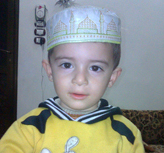
Ahmad Kayali was killed along with this mother, two sisters, uncle and cousin when his home in Aleppo was destroyed by an airstrike by the Syrian army.
“When I went to work, I never thought that it was the last time I would see my family. I lost all that was dearest to me, my children, my wife, my brother, my cousins, everybody.”
This statement by the husband of Asma Kayali, 25, sums up the situation civilians in Aleppo. Asma was killed with her three children – her daughters Kawthar and Fatima, aged nine and seven, and her four-year-old son Ahmad – when her home was bombed to dust by an air strike on August 6. In total, 10 members of the Kayali family – seven of them children – were killed in that attack, which is emblematic of Syria’s spiraling human rights crisis.
Today, the assault on Aleppo continues unabated, and more civilians are at risks to get killed by indiscriminate attacks carried out by government forces.
Unfortunately, my recent concerns about the specter of an imminent deployment of heavy weaponry in the densely populated environment of Aleppo have become a reality (also check out these pictures of urban warfare from a Reuters photographer). The result is a mounting number of war crimes piling onto an already extensive list of atrocities committed in Syria.
Shocking account from Aleppo
One of my colleagues just returned from Aleppo, and her horrific account shocks the conscience. Scores of civilians, many of them children, have been killed and many more injured, in recent weeks as a result of government sanctioned air strikes and artillery and mortar attacks on residential neighborhoods. Some of the victims died in the very places they had sought shelter, having been forced to flee their homes due to the fighting. My colleague investigated some 30 attacks in which more than 80 civilians who were not directly participating in hostilities were killed and many more were injured. Her documentation of these crimes adds to the findings of other investigations such as the United Nations Commission of Inquiry.
Opposition fighters, while mostly fighting with short-range light weapons, have at times also used imprecise or indiscriminate weapons (such as mortars and home-made rockets) that equally pose a danger to civilians. Both government forces and armed opposition groups have an increasing presence in residential areas, thus further putting civilians at risk. As the conflict continues, there are growing concerns about increased abuses, including unlawful killings and ill-treatment of captives by opposition fighters belonging to a plethora of armed opposition groups, including the Free Syrian Army (FSA).
All parties to the conflict in Syria must abide by International Humanitarian Law (IHL), refrain from attacks against civilians and take the necessary precautionary measures to protect civilians.
What else will it take for the UN Security Council to act?
Recent reports by international human rights organizations with access to Syria such as Amnesty International and Human Rights Watch, as well as by the United Nations, are only the newest evidence of large scale violations of human rights in Syria. Crimes against humanity have been extensively documented over the last 18 months. How much more will it take until the UN Security Council will end its shameful silence? A referral to the International Criminal Court by the Council could be the beginning of the end of the spectacular failure by the international community to guarantee the basic human rights of Syrians.